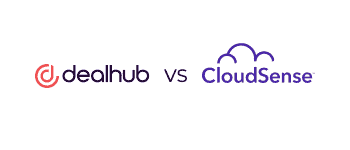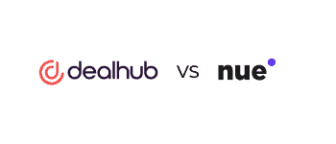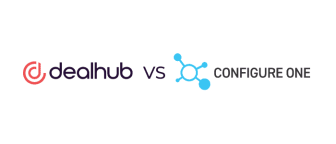Introduction
Compare DealHub CPQ vs. CloudSense CPQ
DealHub CPQ is part of the DealHub platform that accelerates quote-to-revenue execution. Known for its intuitive interface and seamless integration with CRMs like Salesforce, Microsoft Dynamics, and HubSpot, DealHub CPQ enables sales teams to generate accurate quotes quickly and efficiently. The platform’s guided selling capabilities help users navigate complex pricing structures, while its no-code workflow automation ensures flexibility in approval processes. Additionally, DealHub CPQ includes built-in subscription management and contract lifecycle management, making it a versatile tool for companies looking to streamline their revenue operations.
CloudSense CPQ, on the other hand, is a powerful solution tailored for industries with highly complex sales processes, such as telecommunications, media, and utilities. Built natively on Salesforce, CloudSense CPQ leverages the CRM’s capabilities to provide deep customization and automation for product configuration, order management, and pricing rules. The platform is particularly strong in handling usage-based pricing models and multi-layered approval workflows, making it ideal for businesses that require extensive scalability and industry-specific functionality. CloudSense also offers advanced catalog and contract management features, ensuring enterprises can manage their entire sales lifecycle within a single ecosystem.
Product Overview
Overview of each CPQ Solution
Defining DealHub CPQ
DealHub CPQ is designed to help B2B companies across industries automate complex quote-to-revenue (QTR) processes. It includes advanced features like subscription management, upsell/cross-sell support, billing integration, and revenue insights.
DealHub CPQ helps companies standardize their sales processes to increase sales productivity. During guided product configuration, the first stage of the QTR process, reps can quickly access their product catalog and assemble itemized quotes based on customer needs and preferences.
DealHub recently upgraded its user interface and search capabilities. It features a consolidated, customizable workspace with a clean layout, making it easier to access and organize opportunities and proposals from a single view. Advanced filtering capabilities help users quickly surface critical deals, such as upcoming renewals or proposals needing attention, using customizable, shareable filters with visual cues for easy recognition.
DealRoom streamlines the buying process by reducing back-and-forth communication between stakeholders. This digital sales room provides a centralized platform where buyers and sellers can efficiently share documents, approve quotes, revise contracts, and address concerns. DealHub’s integrated Deal Talk enables real-time, deal-specific messaging directly within proposals, streamlining internal collaboration and eliminating the need for disconnected email threads. Visual indicators in the proposal list view highlight active conversations, so teams can stay aligned and act faster. DealStream delivers real-time visibility into prospect engagement. Reps and managers can see who’s viewing, sharing, or downloading proposals, gaining valuable insights without extra setup.
DealHub automates subscription renewals and facilitates contract amendments for companies with recurring revenue models, reducing customer churn. Bi-directional data sync with CRM and ERP systems ensures data consistency across platforms and reduces error-prone manual processes.
Defining CloudSense CPQ
CloudSense CPQ is an intelligent, cloud-based solution built on Salesforce. Guided product configuration and automated document generation help companies streamline sales. By connecting to Salesforce, CloudSense delivers real-time visibility into customer data across departments, providing reps with a full view of the customer journey from lead to close.
CloudSense is designed to power omnichannel sales, including direct (e.g., field sales and roadshows), digital (e.g., ecommerce and online portals), and outbound (e.g., webinars and cold calls). Its automated configuration capabilities also offer customers personalized product recommendations based on their needs and preferences and upsell opportunities to maximize order value.
Product Features
Comparison of Key Features
DealHub and CloudSense serve different customer segments, so the platforms have specific features tailored to their respective customers.
DealHub takes a streamlined approach to product configuration, leveraging guided selling capabilities to automate the process. Product catalogs and a rules-based pricing engine are configured during implementation to enable error-free quoting. The platform’s no-code environment enables SalesOps teams to change products and pricing as needed.
DealHub stands out with its DealRoom, a modern alternative to static sales quotes and proposals. All deal documents and supporting content are located in a digital sales room. DealRoom’s buyer engagement tracking and notifications facilitate deal collaboration and quote approvals. It’s perfect for companies selling to buyers with multiple decision-makers.
CloudSense is more of a jack-of-all-trades—its platform is designed to meet the needs of companies with multiple vendors, digital self-service portals, and several sales channels and revenue streams. It allows energy companies, utilities, and other businesses with usage-based models to create customized solutions for clients and manage their contracts individually.
Here’s a breakdown of each product’s features:
| DealHub CPQ | CloudSense CPQ |
|---|---|
| A unified quote-to-revenue platform, including CPQ, CLM, DealRoom, e-signature, invoicing, subscription management, and sales engagement insights. | Technical solution designed for telecoms, energy companies, utilities, media companies, and other organizations using non-linear pricing models. |
| Integration with third-party software, including Salesforce, Freshworks CRM, Microsoft Dynamics 365, HubSpot, accounting software, DocuSign, and ERP systems. API integrations sync pricing and other data into the playbook and enable advanced user management. | Built on Salesforce, and integrates with all Salesforce apps for a unified interface and experience. |
| Quick and easy no-code setup process, enabling your team to be up and running within weeks. Customizable Proposal and DealRoom layouts align with the way you work. | Implementation time depends on the complexity of the organization and requirements of its customers. |
| Guided selling and advanced filtering empower sales reps to create winning proposals quickly and easily through an intuitive quoting process synced to your CRM. | Powerful product configurator that allows salespeople to estimate costs based on historical data. |
| Designed with scalability in mind, readily accommodating growth and expansion of sales teams. | Capable of handling large-scale, complex product configurations and one-off contracts, making it great for large project-based deals. |
| With DealRoom, digital proposals can be easily sent via one URL, allowing companies to provide their customers with one point of interaction throughout all deal stages rather than multiple files or links. | CPQ capabilities extend to partners and value-added resellers (VARs). |
| Out-of-the-box contract management, document generation, e-signature, and multi-dimensional pricing models. | Offers a comprehensive suite of tools for managing product configurations, pricing models, and documentation. |
| Predictive sales playbooks accelerate the sales process by guiding sales reps. | Uses advanced configuration rules to help sales reps manage multiple disparate vendors and partners. |
| Comprehensive subscription, renewal, and order management capabilities with rules-based quoting for complex sales. | Centralized product catalog for products and related services offered by the company, enabling accuracy in variable service/product estimates. |
| Offers buyer engagement insights to equip sales reps with actionable data for refining future sales engagements. | Provides detailed configuration data, aiding sales reps in refining their approach for future sales engagements. |
| Automated approval workflows ensure defined user roles and faster sales cycles. Deal Stream enables deal-specific buyer engagement insights while Deal Talk enables real-time, deal-specific messaging directly within proposals. | Provides detailed configuration data, aiding sales reps in refining their approach for future sales engagements. |
| Audit trails for accountability and transparency. | Automation in order and subscriber management reduces order fulfillment costs. |
| Supports multi-currency price quotes with localized pricing for international companies. | Supports multi-currency quoting and pricing for global companies. |
| Web-based platform. | Web-based platform. |
| Implementation team Phone support Mobile and online customer support Knowledge base DealHub Academy | Online support Customer help portal Webinars and lessons Training and enablement from CloudSense experts |
Customer Size
Ideal Customer Profiles
While both solutions enhance the sales quoting process, their strengths lie in different areas.
DealHub CPQ is best suited for companies prioritizing ease of use, fast implementation, and seamless CRM integration, making it an excellent choice for mid-market and enterprise sales teams seeking efficiency.
With DealHub, all sales reps need is input data from their prospects, and their quote can be ready within minutes. Throughout the contract negotiation process, all document sharing and stakeholder communication can take place through DealRoom, saving reps time and preventing deals from slipping through the cracks.
CloudSense CPQ, in contrast, is ideal for businesses with intricate pricing models and regulatory requirements, offering a highly customizable approach for industries with specialized needs. It is is well-suited for organizations (large and small) with complex product configurations, product and service bundles, multi-tiered contracts, and multiple stakeholders to manage.
Customer Support
Support Features & Resources for Each Solution
At DealHub, thorough customer support begins with onboarding and implementation. Its team of experts assists new customers in setting up and integrating the solution and educates sales reps and managers on using it efficiently. Continued support post-purchase drives software adoption and minimizes the chances of any problems arising after implementation.
CloudSense is a specialized tool. With extensive experience in telecommunications, media, and utilities, its in-house professionals are experts at CPQ implementation in these domains. CloudSense also offers customer support and training to help its customers get the most out of its software.
Pricing
Breakdown of Pricing Options
Pricing is a big factor when deciding which CPQ software to choose. While each company has its own pricing model, some general trends are helpful to explore.
DealHub’s pricing is quote-based but starts at around $50. If customers want an accurate quote, they should contact the team directly.
CloudSense CPQ is completely quote-based with no pricing information available on its website. Pricing depends on the functionality and level of customization needed for each customer’s product configuration, so prospective customers to contact CloudSense directly for a quote.
Here’s a quick rundown of the costs associated with each product:
| DealHub CPQ | CloudSense CPQ | |
|---|---|---|
| Product Pricing | Contact sales | Contact sales |
| Implementation Fees | One-time implementation fee | One-time implementation fee |
| Additional Licenses | No additional license fees | Additional licensing for Salesforce AppExchange add-ons |
Summary
Considerations for Choosing Between the Two Solutions
When selecting between DealHub and CloudSense, businesses should consider their industry, sales complexity, and integration needs.
DealHub CPQ is ideal for companies seeking a user-friendly, no-code solution with strong guided selling capabilities and seamless CRM integrations, including Salesforce, Microsoft Dynamics, and HubSpot. Its intuitive, customizable interface and quick implementation make it a great choice for mid-market and enterprise sales teams looking to streamline complex pricing and quoting without requiring extensive IT involvement.
CloudSense CPQ, on the other hand, is best suited for industries with highly specialized sales processes, such as telecommunications, media, and utilities. Built natively on Salesforce, it offers deep customization for complex product configurations, multi-layered approval workflows, and usage-based pricing models. Businesses that require extensive order management, contract lifecycle automation, and multi-currency quoting will find CloudSense particularly beneficial, especially if they already rely on Salesforce as their primary CRM.
Ultimately, the choice between DealHub and CloudSense depends on the level of customization and industry-specific functionality a business requires. Companies that need an agile, easy-to-use CPQ solution with broad CRM compatibility may prefer DealHub, while those operating in regulated industries with intricate pricing structures and large-scale order management needs may find CloudSense a better fit.
FAQs
Frequently Asked Questions
The best way to evaluate your needs is to look at your current sales process and identify which tasks can be automated or improved with the help of CPQ software. If you have a lot of complex product configurations, then it’s likely that you need a tool like CloudSense to streamline order fulfillment. If you need a more repeatable process to scale, DealHub will fit better into your workflow.
DealHub CPQ allows for guided selling and error-free quoting. The sales process is streamlined through approval workflows, and the software integrates easily with Salesforce CRM. Through API, it also integrates with enterprise data sources and back-end systems to provide a seamless customer journey.
CloudSense is built on microservices as a part of the Salesforce ecosystem. Although it is a separate software altogether, it offers users a way to generate quotes while working in the Salesforce environment. CloudSense also offers customer support, training sessions, and post-implementation services to ensure the software is being used effectively and customers are taking advantage of its capabilities.
Being built on Salesforce means that CloudSense is a part of the Salesforce family. It uses the same microservices architecture but is not directly connected to Salesforce. This allows CloudSense users to take advantage of CPQ functionalities individually while remaining in their sales environment and leveraging the strength of the Salesforce platform. For non-Salesforce customers, CloudSense still offers CPQ capabilities through its own platform.

Rhonda Bavaro excels in boosting SaaS companies’ growth through innovative content marketing, thriving in the dynamic sales tech industry amidst evolving technologies that drive revenue acceleration.








